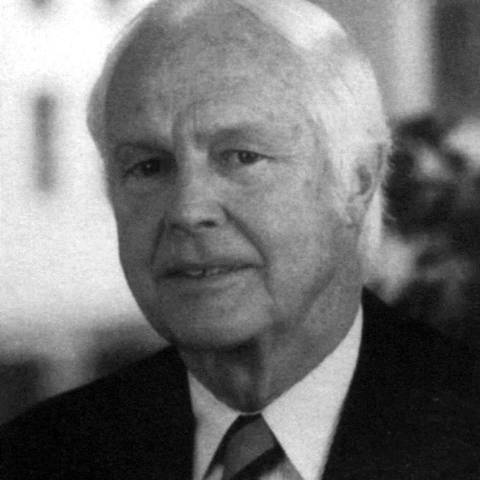Darlington School is saddened by the passing of one of its most notable alumni, Ramsay Potts (’34) of Arlington, Va., and Delray Beach, Fla., a highly decorated World War II combat pilot and attorney. Potts, 89, was associated with the School for more than half a century – as a boarding student, the 1985 Distinguished Alumnus, and, most recently, by lending his name to the 2002-03 Annual Fund campaign.
“One of WWII’s most decorated heroes and one of Washington, D.C.’s most prominent attorneys, Ramsay remained connected to Darlington as a Board of Visitor member, Commencement speaker, Washington alumni host, generous supporter and wonderful friend,” said Jim McCallie, former president of Darlington. “His love for his Darlington experience generated terrific tales, and his gratefulness to those Darlington faculty and administrators who helped shape him continued throughout his lifetime. All of Darlington can take pride in our association with a great alumnus and man.”
Born Oct. 24, 1916, Potts attended grammar school in Memphis, Tenn., and came to Darlington for his junior and senior years. After graduation, he went on to the University of North Carolina at Chapel Hill, where he was a Southern Conference leader in tennis and guard on the basketball team. He studied economics and English, earning his Bachelor of Science in Commerce in 1941.
The same year, Potts enlisted in the Army Air Force, serving as a combat pilot during World War II. Assigned to the 8th Air Force, he flew B-24 Liberator bombers in missions over France and North Africa and participated in a vital raid on oil refineries at Ploesti, Romania, one of the top sources of petroleum to the Germans.
For the August 1943 run at Ploesti, he had to fly a house-top level, enduring what a military publication at the time called “merciless fire from almost every conceivable ground defense weapon … During the target run, a direct flak burst tore away the vertical stabilizer, and another blast shattered the elevator control cables at one point.”
The plane, called the Duchess, nearly lost control until the engineer spliced the torn cables with .50-caliber shell links. When the Duchess returned to base, it had more than 50 fist-sized holes in the wings and fuselage.
Potts won many promotions, and was named colonel at age 27. He later became director of bombing operations of the 8th Air Force and, after the war, was a military adviser to the U.S. Strategic Bombing Survey, which analyzed the effectiveness of bombing missions against the Axis powers. For that work, he interviewed top Nazi leaders, including Hermann Goering, Albert Kesselring and Alfred Jodl.
In 1946, Potts enrolled at Harvard University law school, graduating two years later. He moved to Memphis to practice law. In 1958, he and three other attorneys founded a firm in Washington that, after some changes among top partners, was known as Shaw, Pittman, Potts & Trowbridge. The firm’s portfolio included corporate law, securities regulation, environmental law and nuclear energy issues.
One of Potts’ clients was the Investment Company Institute, a trade group for the then-new mutual fund industry. He was also a specialist on air transportation law after serving as special assistant to then-Air Force Secretary W. Stuart Symington and president of the Military Air Transport Association, a trade organization of charter and cargo carriers.
Potts’ military decorations included the Army Distinguished Service Cross, two awards of the Silver Star, the Legion of Merit, three awards of the Distinguished Flying Cross, the Bronze Star and five awards of the Air Medal. He retired from the Air Force Reserve as a major general in 1972, and was fundraiser for the Mighty Eighth Air Force Museum near Savannah, Ga.
In 1986, Potts retired as managing partner of Shaw, Pittman, Potts & Trowbridge and became senior counsel of the firm, which grew to more than 300 lawyers with offices in Tysons Corner, New York, Los Angeles and London.
He was past-president and former trustee of the Air Force Historical Federation and served as special assistant to the chairman of the National Security Resources Board and the administrator of the Reconstruction Finance Corporation, as well as associate counsel to the U.S. Senate Armed Services Subcommittee. He also served on the Board of Emerson Electric Co. and was, for decades, heavily involved in Washington-area tennis tournaments as a player and organizer.
“No one lived a fuller life than Ramsay,” said his brother Steve Potts (’48). “His was four or five lives wrapped into one.”
Potts died May 28, 2006. He was the great-grandson of Dr. Luther Rice Gwaltney, the first president of Shorter College and former pastor of First Baptist Church of Rome.
Potts was preceded in death by his wife, Veronica Raynor Potts, whom he married in 1945, and a brother, Van Dyke Potts (’36). He is survived by four children, Ramsay Douglas Potts IV, David H. Potts ('68), Lesley Potts and Lindsay Potts-Beckwith; brother, Steve Potts (’48); sisters, Anne Lunde, Susan Youmans-Whitaker and Penny Bailey; and six grandchildren.

